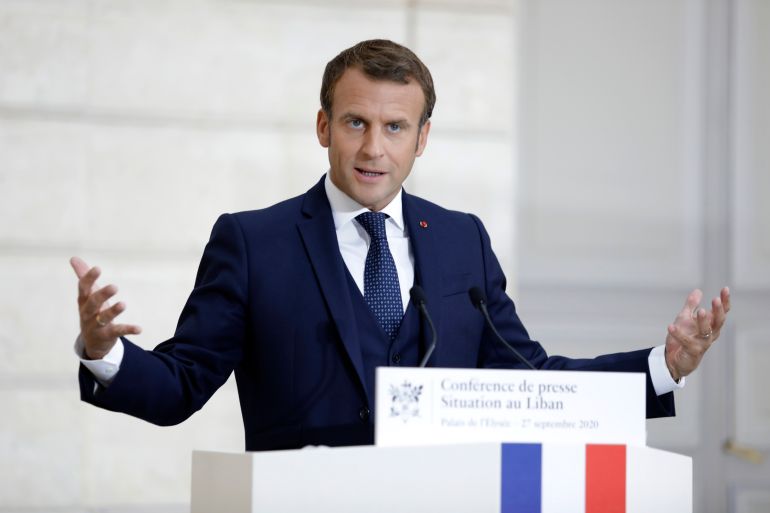Macron accuses Lebanon’s leaders of ‘betrayal’ for failures
Macron singles out Hezbollah for criticism and gives Lebanon’s political class four to six weeks to implement road map.

French President Emmanuel Macron has accused Lebanon’s leaders of “collective betrayal” for their failure to form a government in the wake of the huge explosion at the Beirut port in August.
At a rare news conference devoted to Lebanon on Sunday, Macron slammed the Lebanese political elite for prioritising their selfish interests over those of their country.
Keep reading
list of 4 itemsTo rebuild Lebanon and its economy, uproot corruption
In full: France’s draft proposal for new Lebanon government
Lebanon turns 100 amid upheaval and crises
“They have decided to betray this commitment [to form a government],” Macron told reporters, declaring he was “ashamed” of the country’s leaders.
Macron had repeatedly pressed Lebanon’s leaders to form the government, saying a reform-minded cabinet was essential if aid were to flow in to rebuild the country.
Lebanon’s Prime Minister-designate Mustapha Adib stepped down on Saturday, saying he had been unable to form a government.
“I see that the Lebanese authorities and political forces chose to favour their partisan and individual interests to the detriment of the general interest of the country,” Macron added.
Macron said none of the leaders of Lebanon – where, in the wake of the 1975-1990 civil war, power is traditionally shared between Shia Muslims, Sunni Muslims and Christians – had been up to the task.
“All of them bet on the worst-case scenario for the sake of saving themselves, the interests of their family or their clan,” he said.
“I, therefore, have decided to take note of this collective betrayal and the refusal of Lebanese officials to engage in good faith.”
‘Last chance’
Macron sent a pointed warning to the Iran-backed Shia group Hezbollah, which was well represented in the outgoing government and some analysts accuse of holding up the process.
Hezbollah should “not think it is more powerful than it is … It must show that it respects all the Lebanese. And in recent days, it has clearly shown the opposite,” said Macron.
“There’s a question that needs to be asked to Hezbollah and ourselves. Is it really a political party or does it proceed just in a logic dictated by Iran, and its terrorist forces?” he added.
Macron, who visited Lebanon twice in the wake of the explosion, had repeatedly urged the Lebanese not to waste any more time in forming a government.
The August 4 explosion of hundreds of tonnes of ammonium nitrate at the Beirut port killed more than 190 people, wounded thousands and ravaged large parts of the capital.
The disaster set off new protests against corruption and mismanagement, prompting the previous cabinet to step down.
He gave Lebanon’s political class four to six weeks to implement his road map for political and economic reform set out on his last visit on September 1, and said he would commit to holding a donor conference for Lebanon in October. He ruled out imposing sanctions for now.
“It is now up to Lebanese officials to seize this last chance themselves,” he said.
But Al Jazeera’s Natacha Butler, reporting from Paris, said Macron was not left with many options and he had not made it clear what would happen if the “last chance” failed to deliver results.
“He has not ruled out the option of using French sanctions against some political leaders if they can be linked directly to corruption though,” Butler said.
Al Jazeera’s Zeina Khodr, reporting from Beirut, said billions of dollars in funds are urgently needed to revive the economy in a country in which 55 percent of its five million people live in poverty.
“People are concerned – they know that if there is no ‘credible government’, or a government that is seen to be legitimate in the eyes of the international community, that money will not be pouring into the country,” Khodr said.